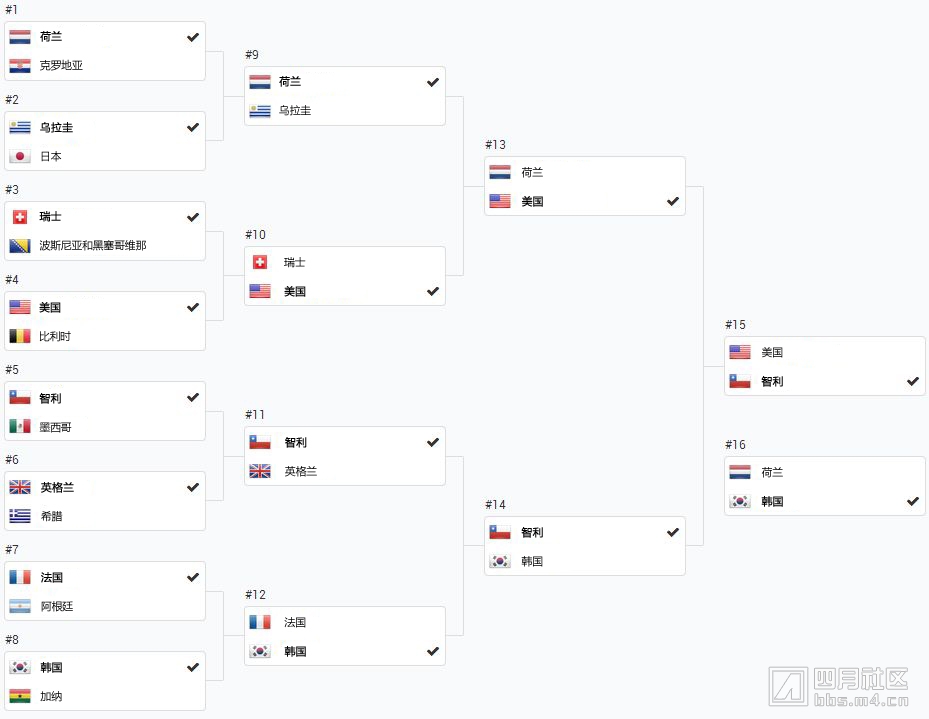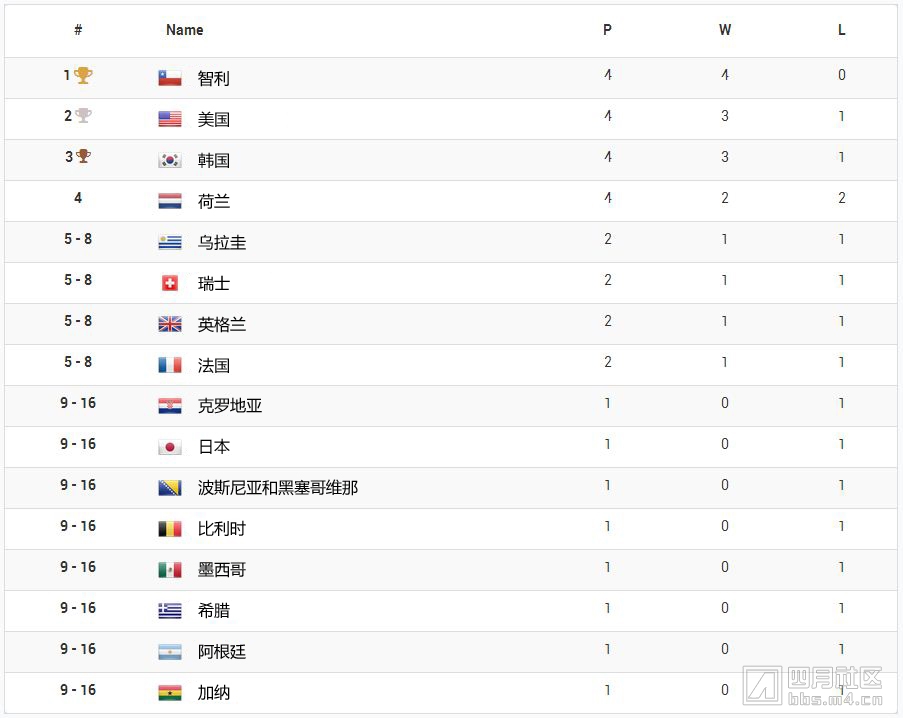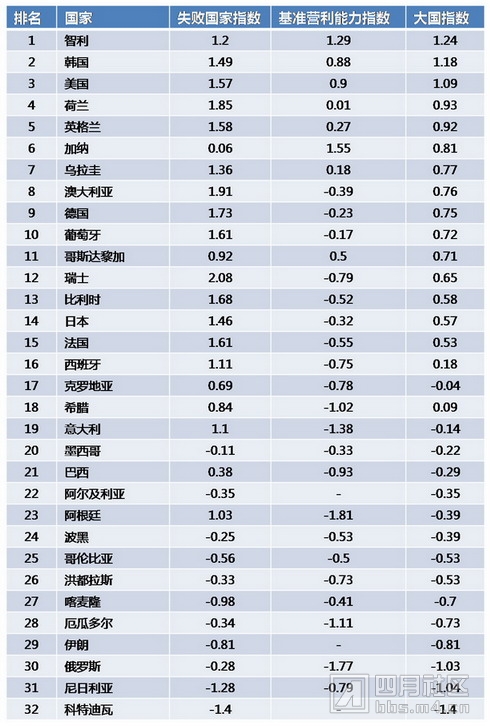|
|
本帖最后由 满仓 于 2014-6-23 10:37 编辑
【中文标题】大国指数:《外交政策》的世界杯预测
【原文标题】The GNOE: Foreign Policy’s World Cup Predictor
【登载媒体】外交政策
【原文作者】DANIEL ALTMAN
【原文链接】http://www.foreignpolicy.com/articles/2014/06/12/the_gnoe_foreign_policys_world_cup_predictor]http://www.foreignpolicy.com/articles/2014/06/12/the_gnoe_foreign_policys_world_cup_predictor[/url]
可以用政治和经济变量预测足球比赛的结果吗?当然可以,或许吧……
4届世界杯之前,一个难以想象的命运降临在美国身上。一支来自极度贫穷的国家、一个彻头彻尾独裁的国家、一个与美国商业巨擎无法相提并论国家的足球队,在世界最大的足球盛会上击败了美国队。1998年里昂的一天,伊朗凭借自身在这项赛事中的第一场胜利,以2比1击败了他们心目中的撒旦。身为世界第二和第三大经济体的日本和中国,却无法取得胜利,斯堪的纳维亚半岛的人权榜样和政治典范也乏善可陈——至少在瑞典1958作为东道主年打入决赛之后就是如此。
但是,如果政治和经济因素真的可以决定世界杯比赛的结果将会如何?
幸运的是,我们在《外交政策》有现成的工具用来分析未来的结果。每年,我们会发布两组数据:“基准盈利能力指数”(衡量各个国家吸引外资的能力)和“失败国家指数”(衡量国家应对社会、政治和经济压力的能力)。当我们把这些排名整合在一起,就可以发现这个世界上真正的赢家究竟是谁。(当然,这或许和在草坪上把一个球踢来踢去的水平不大相关,但是请听我说完。)
我们在排名中减去这些国家的财富值,并除以标准偏差,以确保各国数值的可比性,然后平均两个指数,最终形成“大国指数”。参加今年世界杯的三个国家——阿尔及利亚、科特迪瓦和老朋友伊朗——没有基准盈利能力指数,所以我们仅使用了失败国家指数。结果看起来……很有趣。


就像世界杯的分组一样,G组是名副其实的死亡之组。其中的每一个国家大国指数排名都在前十,也就是说,德国和葡萄牙不要指望晋级16强。然而,或许澳大利亚抽到了最悲惨的一签。尽管它在大国指数中排名第8,但排名第1的智利和排名第4的荷兰必将提前晋级。抱歉,澳洲人,你们繁荣的经济和医疗政策只能让你们走这么远了。
巴西的遭遇更加悲惨。它的失败国家指数的排名勉强高于平均数,但基准营利指数的排名一塌糊涂,最终导致大国指数排名21位。别提举起大力神杯了,它根本无法进入淘汰赛。
与此相比,美国这次不用再担心伊朗了,通往决赛的道路一片光明。它的拦路虎不是俄罗斯和中国,而是地缘政治和经济力量崛起的新星智利。(韩国在参赛队伍中排名第二,但是分组让它在半决赛中遭遇智利。不幸啊。)
但是别担心,亲爱的卢森堡、东帝汶和其它足球场上的倒霉蛋。如果你们的国家队今年未能踏上桑巴国度的热土,你们还是可以欣喜地看到自己国家在大国指数中的排名。
很多人——也包括我自己——都试图用足球专业知识和统计数据来预测世界杯的结果,但是说不定大国指数也可以呀。以下就是完整的预测结果,我们可以看看,一个顽皮的小猴子乱丢飞镖的结果会不会比专家,或者说章鱼来得更准确呢?
大国指数排名

原文:
Can political and economic variables predict soccer results? Of course they can, maybe.
Four World Cups ago, something unthinkable happened to the United States. A team from a much poorer country, a downright oppressive country, a country with no business competing with the American juggernaut, beat the United States on soccer's biggest stage. On that day in Lyon in 1998, Iran won 2-1, eliminating the Great Satan with their first-ever victory in the tournament. Japan and China, the world's second and third economic superpowers, can't claim any more success, nor can the Scandinavian paragons of human rights and political virtue -- at least, not since Sweden made the final at home in 1958.
But what if politics and economics really could determine the outcome of matches in the World Cup?
Fortunately, we at Foreign Policy have just the tools needed to see what would happen. Every year, we publish two indexes: the Baseline Profitability Index (BPI), which ranks countries around the world for the attractiveness of foreign investment, and the Failed States Index (FSI), which ranks their abilities to deal with social, political, and economic pressures. And when we combine these rankings, we find out who the world's real winners are. (Clearly, this may have little to do with the ability to kick a ball around on a grass pitch, but bear with us.)
We standardized the index values by subtracting their means and dividing by their standard deviations, then averaged the two to create, wait for it, the Greatest Nation on Earth index (GNOE). Three countries in this year's World Cup -- Algeria, Ivory Coast, and good old Iran -- were not in the BPI, so I just used the standardized FSI for them. The results were, shall we say, interesting.
Just as in the real tournament, Group G is the Group of Death. Every team in the group makes the GNOE top 10, which means Germany and Portugal can't even hope to make the Round of 16. The toughest draw, however, has to be Australia's. It's the eighth team in the GNOE, but top-ranked Chile and the fourth-ranked Netherlands will qualify ahead of it. Sorry, Aussies, but your thriving economy and healthy polity will only get you so far.
There's more bad news for Brazil. It's slightly above average in the FSI, but decidedly poor in the BPI, giving it a GNOE ranking of 21 out of 32. Not only will it fail to win the tournament; it won't even enter the knockout rounds.
By contrast, this time the United States has no need to worry about Iran. There's a smooth road ahead to the final, where it will lose not to Russia or China, but to that rising star of geopolitics and economic policy, Chile. (Korea is ranked second going into the tournament, but the bracket pits it against Chile in the semifinals. Tough luck!)
But don't fret, dear Luxemburgers, Timorese, and other soccer unfortunates: if your national team didn't make it to The Big Samba this year, you can still see how they rank on GNOE. Just select your country below to see how they measure up!
Plenty of people -- myself included -- are trying to use their knowledge of soccer and statistics to predict the outcome of the real tournament. But wouldn't it be something if the GNOE did just as well? Here are the complete predictions, so everyone can see whether a policy-loving monkey with a dartboard can do better than the experts, or, say, an octopus.
The Greatest Nation on Earth Rating
|
评分
-
1
查看全部评分
-
|
